第八课主要介绍递归和动态规划
介绍递归和动态规划
暴力递归:
1,把问题转化为规模缩小了的同类问题的子问题
2,有明确的不需要继续进行递归的条件(base case)
3,有当得到了子问题的结果之后的决策过程
4,不记录每一个子问题的解
动态规划
1,从暴力递归中来
2,将每一个子问题的解记录下来,避免重复计算
3,把暴力递归的过程,抽象成了状态表达
4,并且存在化简状态表达,使其更加简洁的可能
图灵引入的是:我不知道怎么算,但是我知道怎么试。知道怎么暴力破解出来。
要学会,练习懂得怎么尝试。
题目一
求n!的结果
循环是一个知道怎么算的过程(从1乘到n)。
递归是子问题拆分到最小问题的尝试过程。
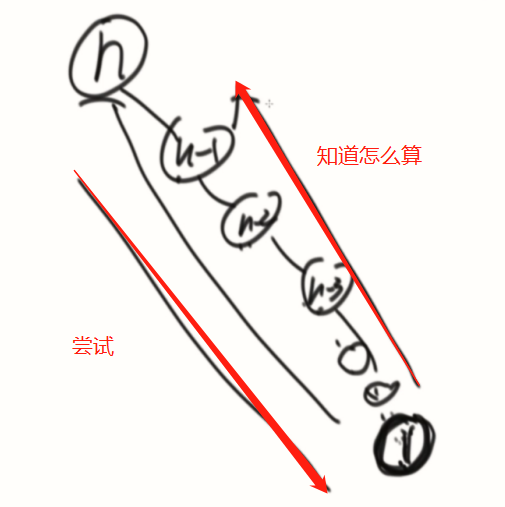
public class Code_01_Factorial { public static long getFactorial1(int n) { if (n == 1) { return 1L; } return (long) n * getFactorial1(n - 1); } public static long getFactorial2(int n) { long result = 1L; for (int i = 1; i <= n; i++) { result *= i; } return result; } public static void main(String[] args) { int n = 5; System.out.println(getFactorial1(n)); System.out.println(getFactorial2(n)); } }
题目二
汉诺塔问题(不能大压小,只能小压大)
打印n层汉诺塔从最左边移动到最右边的全部过程
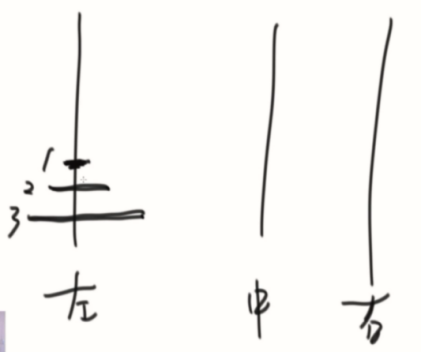
左中右另称为 from、to、help。
划分子问题
1、先把1~n-1从from移动到help
2、把单独的n移动到to
3、1~n-1从help移动到to

时间复杂度就是:
T(n) = T(n-1) + 1 + T(n-1) = 2T(n-1)+1(一个等比公式)
T(n-1)是移动到help
1是从from直接移动到to
T(n-1)是把全部n-1挪回去
总的步数是2的N次方减一
这个题目要学会尝试。
也可以写六个移动的递归,来逐一实现步骤。
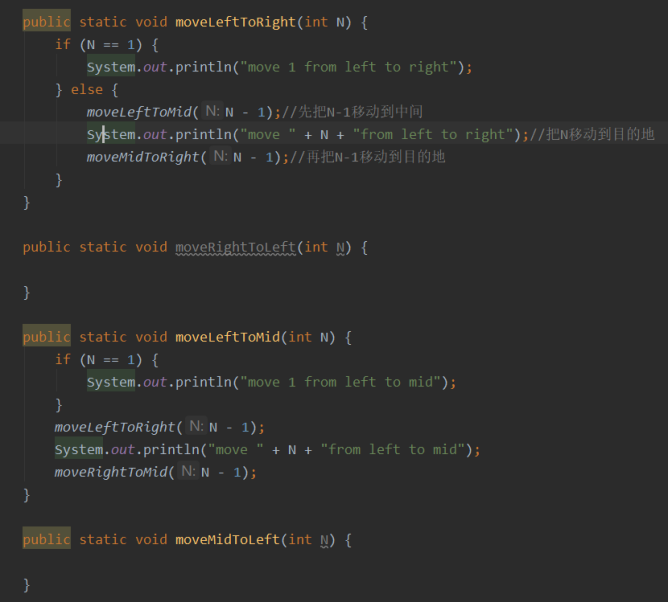
(该问题最基础的一个模型就是,一个竹竿上放了2个圆盘,需要先将最上面的那个移到辅助竹竿上,然后将最底下的圆盘移到目标竹竿,最后把辅助竹竿上的圆盘移回目标竹竿。)
public class Code_02_Hanoi { public static void hanoi(int n) { if (n > 0) { func(n, n, "left", "mid", "right"); } } public static void func(int rest, int down, String from, String help, String to) { if (rest == 1) { System.out.println("move " + down + " from " + from + " to " + to); } else { func(rest - 1, down - 1, from, to, help); func(1, down, from, help, to); func(rest - 1, down - 1, help, from, to); } } //课堂上的代码 //N 表示当前是 1~N的问题 //一开始都在from上 public static void process(int N, String from, String to, String help) { if (N == 1) {//就只有一个了,可以直接移动 System.out.println("Move 1 from " + from + " to " + to); } else {//否则就是1~N的问题 process(N - 1, from, help, to);//把1~N-1个从from移动到help System.out.println("Move " + N + " from " + from + " to " + to);//单独把N移动到to process(N - 1, help, to, from);//第三步是挪回来,把在help上的挪到to } } public static void moveLeftToRight(int N) { if (N == 1) { System.out.println("move 1 from left to right"); } else { moveLeftToMid(N - 1);//先把N-1移动到中间 System.out.println("move " + N + "from left to right");//把N移动到目的地 moveMidToRight(N - 1);//再把N-1移动到目的地 } } public static void moveRightToLeft(int N) { } public static void moveLeftToMid(int N) { if (N == 1) { System.out.println("move 1 from left to mid"); } moveLeftToRight(N - 1); System.out.println("move " + N + "from left to mid"); moveRightToMid(N - 1); } public static void moveMidToLeft(int N) { } public static void moveRightToMid(int N) { } public static void moveMidToRight(int N) { if (N == 1) { System.out.println("move 1 from mid to right"); } moveMidToLeft(N - 1); System.out.println("move " + N + "from mid to right"); moveLeftToRight(N - 1); } public static void main(String[] args) { int n = 3; hanoi(n); } }
题目三
打印一个字符串的全部子序列,包括空字符串
怎么把脑里面的尝试变成code,就是写递归的能力
尝试方法:
一开始是空字符串,经过0有两个决定要a和不要a,经过1也要决定要不要b,一直尝试下去,列举所有情况。
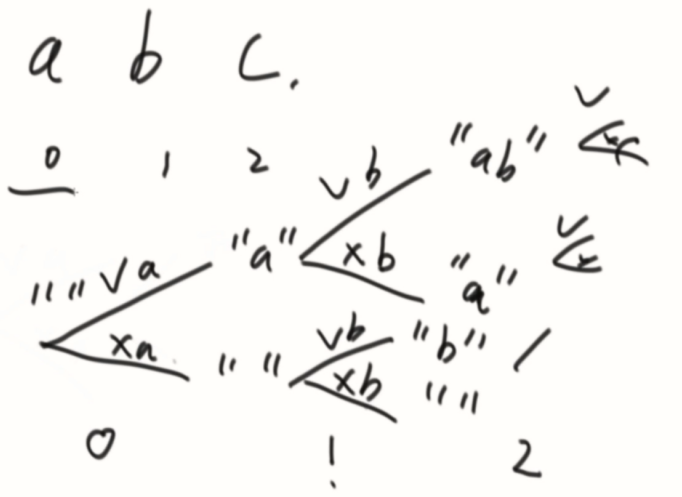
可以画一下你想尝试的图,先来个小规模的,再去写递归就没那么难写了。
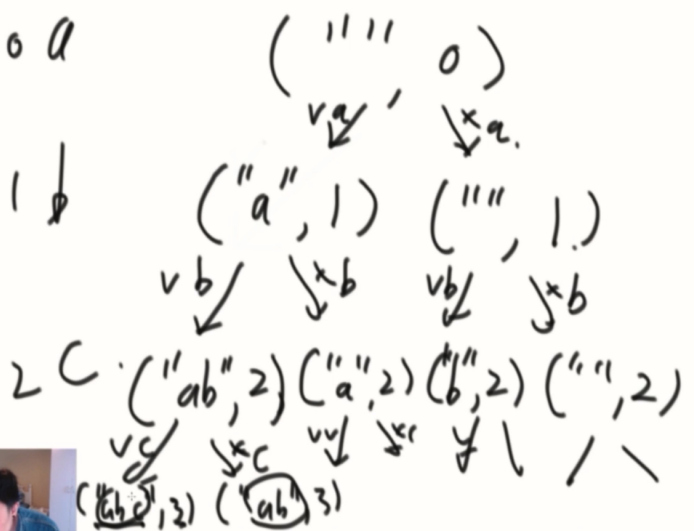
public class Code_03_Print_All_Subsquences { public static void printAllSubsquence(String str) { char[] chs = str.toCharArray(); process(chs, 0); } public static void process(char[] chs, int i) { if (i == chs.length) { System.out.println(String.valueOf(chs)); return; } process(chs, i + 1); char tmp = chs[i]; chs[i] = 0;//用空格代替字符 process(chs, i + 1); chs[i] = tmp;//直接使用字符 } // public static void function(String str) { // char[] chs = str.toCharArray(); // process(chs, 0, new ArrayList<Character>()); // } // // public static void process(char[] chs, int i, List<Character> res) { // if(i == chs.length) { // printList(res); // } // List<Character> resKeep = copyList(res); // resKeep.add(chs[i]); // process(chs, i+1, resKeep); // List<Character> resNoInclude = copyList(res); // process(chs, i+1, resNoInclude); // } // // public static void printList(List<Character> res) { // // ...; // } // // public static List<Character> copyList(List<Character> list){ // return null; // } //课堂上的版本 public static void printAllSub(char[] str,int i,String res){ if (i == str.length){//到达字符串的末尾,已经没有选择了 System.out.println(res); return; } printAllSub(str,i+1,res+" ");//不要当前字符的路 printAllSub(str,i+1,res+str[i]);//要当前字符的路 } public static void printAllPermutation(){ } public static void main(String[] args) { String test = "abc"; printAllSubsquence(test); printAllSub(test.toCharArray(),0,""); } }
题目四
打印一个字符串的全部排列
进阶
打印一个字符串的全部排列,要求不要出现重复的排列
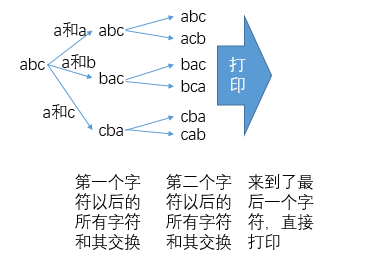
public class Code_04_Print_All_Permutations { public static void printAllPermutations1(String str) { char[] chs = str.toCharArray(); process1(chs, 0); } public static void process1(char[] chs, int i) { if (i == chs.length) { System.out.println(String.valueOf(chs)); } for (int j = i; j < chs.length; j++) { swap(chs, i, j); process1(chs, i + 1); swap(chs, i, j);//回溯 } } public static void printAllPermutations2(String str) { char[] chs = str.toCharArray(); process2(chs, 0); } public static void process2(char[] chs, int i) { if (i == chs.length) { System.out.println(String.valueOf(chs)); } HashSet<Character> set = new HashSet<>(); for (int j = i; j < chs.length; j++) { if (!set.contains(chs[j])) { set.add(chs[j]); swap(chs, i, j); process2(chs, i + 1); //swap(chs, i, j); } } } public static void swap(char[] chs, int i, int j) { char tmp = chs[i]; chs[i] = chs[j]; chs[j] = tmp; } public static void main(String[] args) { String test1 = "abc"; printAllPermutations1(test1); System.out.println("======"); printAllPermutations2(test1); System.out.println("======"); String test2 = "acc"; printAllPermutations1(test2); System.out.println("======"); printAllPermutations2(test2); System.out.println("======"); } }
题目五
母牛每年生一只母牛,新出生的母牛成长三年后也能每年生一只母牛,假设不会死。求N年后,母牛的数量。
一遇到这种递推的题目,不知道怎么试,先列出前几项,递推是有高度结构化的解的。
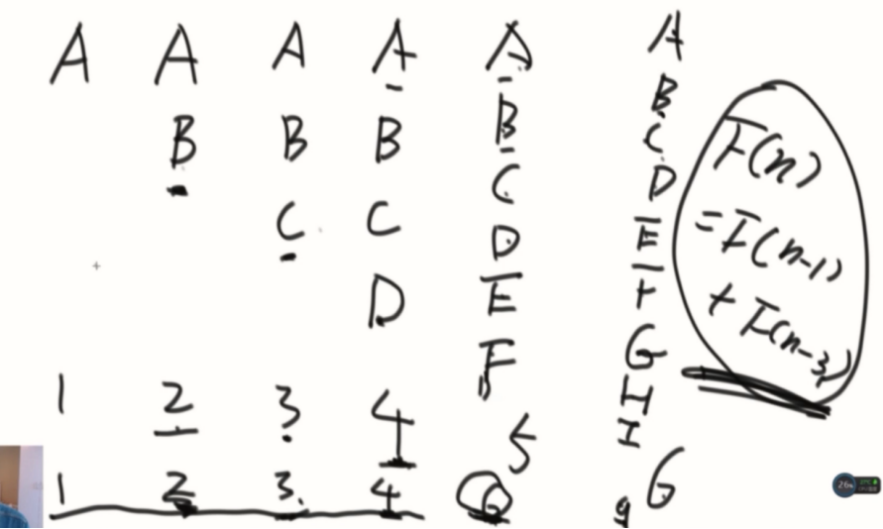
然后要想为什么?
F(n) = F(n-1) + F(n-3)
因为牛都不会死,所以会有去年的牛F(n-1),三年前牛的数量,此时都可以生小牛,所以会有F(n-3)这部分。
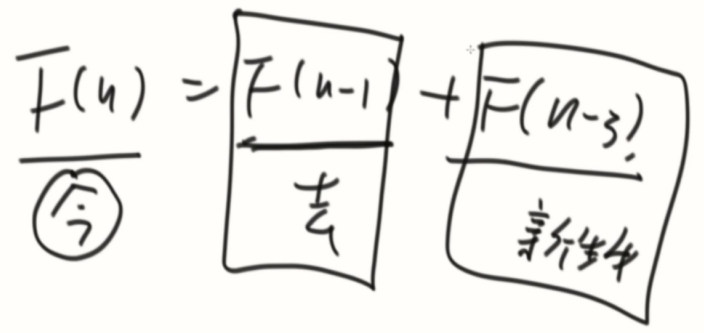
public class Code_05_Cow { public static int cowNumber1(int n) { if (n < 1) { return 0; } if (n == 1 || n == 2 || n == 3) { return n; } return cowNumber1(n - 1) + cowNumber1(n - 3); } //非递归版本 public static int cowNumber2(int n) { if (n < 1) { return 0; } if (n == 1 || n == 2 || n == 3) { return n; } int res = 3; int pre = 2; int prepre = 1; int tmp1 = 0; int tmp2 = 0; for (int i = 4; i <= n; i++) { tmp1 = res; tmp2 = pre; res = res + prepre; pre = tmp1; prepre = tmp2; } return res; } public static void main(String[] args) { int n = 20; System.out.println(cowNumber1(n)); System.out.println(cowNumber2(n)); } }
进阶
如果每只母牛只能活10年,求N年后,母牛的数量。
题目六
给你一个栈,请你逆序这个栈,不能申请额外的数据结构,只能使用递归函数。如何实现?
本题考查栈的操作和递归函数的设计,我们需要设计出两个递归函数。
递归函数一:将栈stack 的栈底元素返回并移除。
具体过程就是如下代码中的getAndRemoveLastElement 方法。
如果从stack 的栈顶到栈底依次为3、2、1,这个函数的具体过程如下图所示。
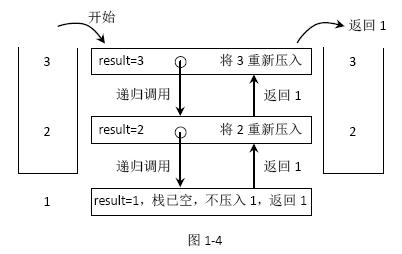
递归函数二:逆序一个栈,就是题目要求实现的方法,具体过程就是如下代码中的reverse方法。该方法使用了上面提到的getAndRemoveLastElement 方法。
如果从stack 的栈顶到栈底依次为3、2、1,reverse 函数的具体过程如图1-5 所示。
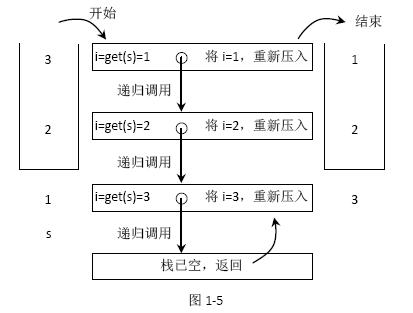
getAndRemoveLastElement 方法在图中简单表示为get 方法,表示移除并返回当前栈底元素。
public class Code_06_ReverseStackUsingRecursive { /** * 以1,2,3为例,从栈顶到栈底依次为3,2,1 */ public static void reverse(Stack<Integer> stack) { if (stack.isEmpty()) { return; } int i = getAndRemoveLastElement(stack);//得到栈底元素 reverse(stack);//递归,所以i依次为1,2,3 stack.push(i);//回溯,依次压入3,2,1 } //得到栈底元素并它移除,并且其它元素压回栈 public static int getAndRemoveLastElement(Stack<Integer> stack) { int result = stack.pop(); if (stack.isEmpty()) { return result; } else { int last = getAndRemoveLastElement(stack); stack.push(result);//回溯,将其它元素重新压回栈 return last;//返回栈底元素 } } public static void main(String[] args) { Stack<Integer> test = new Stack<Integer>(); test.push(1); test.push(2); test.push(3); test.push(4); test.push(5); reverse(test); while (!test.isEmpty()) { System.out.println(test.pop()); } } }
题目七
给你一个二维数组,二维数组中的每个数都是正数,要求从左上角走到右下角,每一步只能向右或者向下。沿途经过的数字要累加起来。返回最小的路径和。
没见过的动态规划有一个统一的套路,写出递归版本尝试版本后,得出来的动态规划的方法是高度套路的。
所有动态规划都是由暴力版本优化来的。
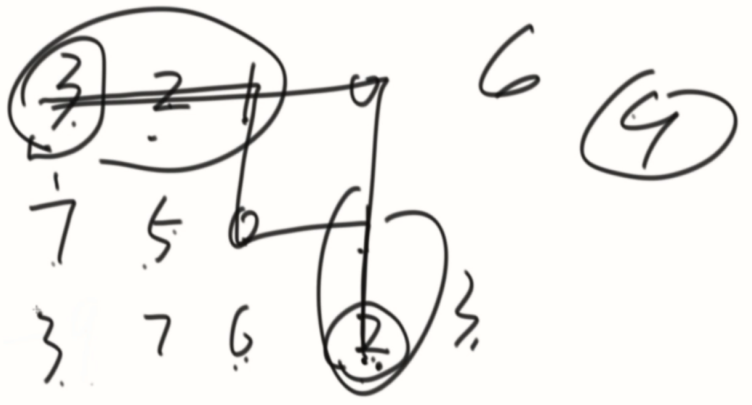
问题划分为了:向下或者向右的结果,从中选最小的路径,就是最后的答案。
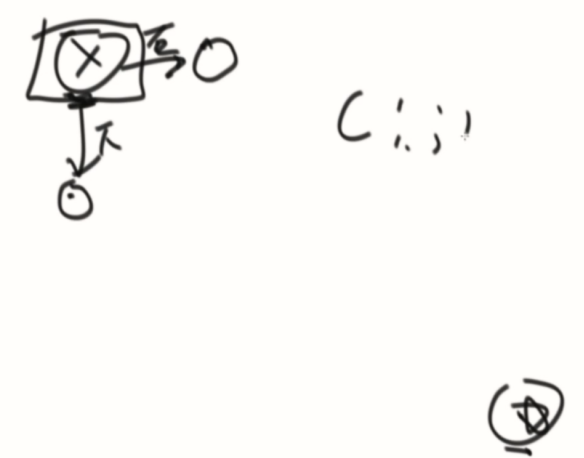
//课堂上的代码 public static int walk(int[][] matrix, int i, int j) { int x = matrix.length - 1; int y = matrix[0].length - 1; if (i == x && j == y) { return matrix[i][j]; } if (i == x)//如果i到达行底部,只能向右走。 return matrix[i][j] + walk(matrix, i, j + 1); if (j == y)//如果j到达列边界,只能向下走。 return matrix[i][j] + walk(matrix, i + 1, j); //其他情况,需要对向下和向右进行对比,选出最优解 int right = walk(matrix, i, j + 1); int down = walk(matrix, i + 1, j); return matrix[i][j] + Math.min(right, down); }
暴力枚举有待优化:有大量的重复解产生,很多部分都重复计算。
把重复计算的部分缓存起来,重复的时候直接调用就能省时间。
什么样的尝试版本递归可以改成动态规划?
当把递归过程展开,发现有重复的状态,与到达它的路径是没有关系的,那么它一定能改成动态规划(无后效性问题)。
有后效性的是,汉罗塔、N皇后问题(前面的举动会影响后面的结果)。
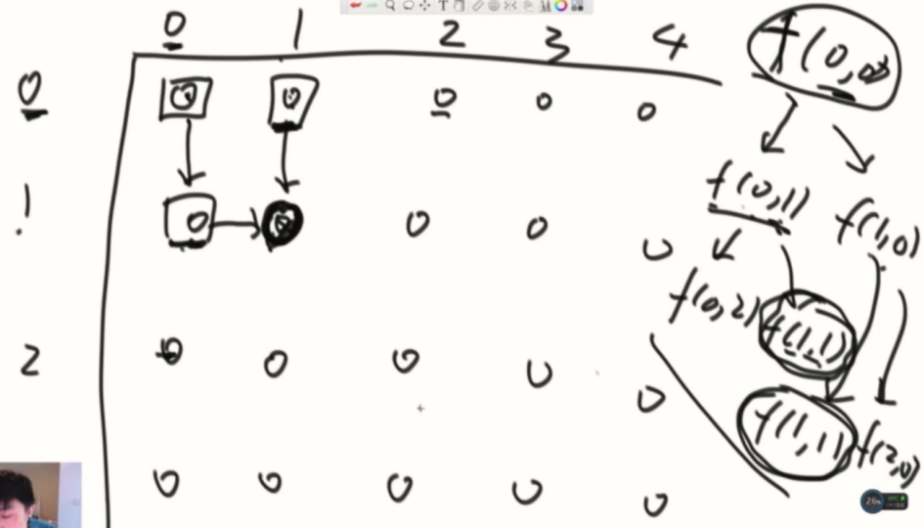
准备一个dp表
1、把需要的位置点出来
2、回到base case中把不被依赖的位置设置好(这题是最后一行/列),然后分析普遍位置是怎么依赖的(需要哪些位置的帮助),反过去就是整个计算顺序。 依次计算,推到顶部就是答案。
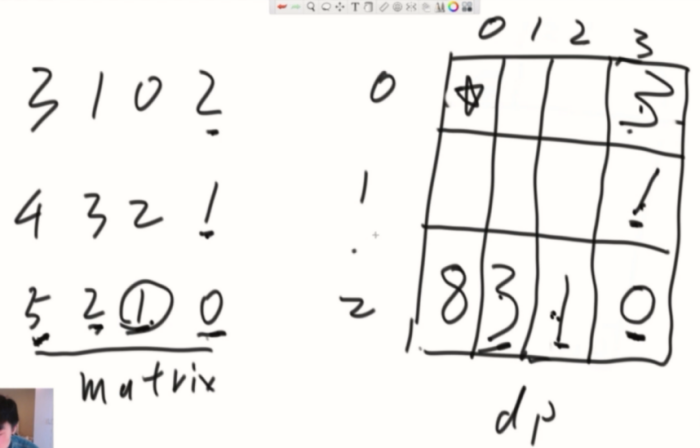
类似一个搭积木的过程,堆积到一定条件就能出现答案。
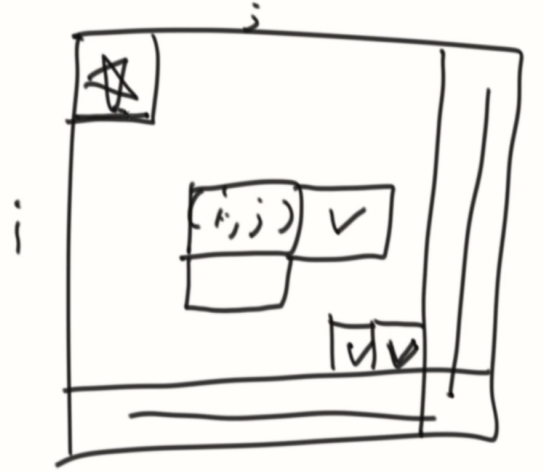
public class Code_07_MinPath { public static int minPath1(int[][] matrix) { return process1(matrix, matrix.length - 1, matrix[0].length - 1); } //从{i,j}出发,到达最右下角位置,最小路径和是多少? public static int process1(int[][] matrix, int i, int j) { int res = matrix[i][j]; if (i == 0 && j == 0) { return res; } if (i == 0 && j != 0) { return res + process1(matrix, i, j - 1); } if (i != 0 && j == 0) { return res + process1(matrix, i - 1, j); } return res + Math.min(process1(matrix, i, j - 1), process1(matrix, i - 1, j)); } //动态规划 public static int minPath2(int[][] m) { if (m == null || m.length == 0 || m[0] == null || m[0].length == 0) { return 0; } int row = m.length; int col = m[0].length; int[][] dp = new int[row][col]; dp[0][0] = m[0][0]; //第一列赋值 for (int i = 1; i < row; i++) { dp[i][0] = dp[i - 1][0] + m[i][0]; } //第一行赋值 for (int j = 1; j < col; j++) { dp[0][j] = dp[0][j - 1] + m[0][j]; } //最优赋值 for (int i = 1; i < row; i++) { for (int j = 1; j < col; j++) { dp[i][j] = Math.min(dp[i - 1][j], dp[i][j - 1]) + m[i][j]; } } return dp[row - 1][col - 1]; } // for test public static int[][] generateRandomMatrix(int rowSize, int colSize) { if (rowSize < 0 || colSize < 0) { return null; } int[][] result = new int[rowSize][colSize]; for (int i = 0; i != result.length; i++) { for (int j = 0; j != result[0].length; j++) { result[i][j] = (int) (Math.random() * 10); } } return result; } //课堂上的代码 public static int walk(int[][] matrix, int i, int j) { int x = matrix.length - 1; int y = matrix[0].length - 1; if (i == x && j == y) { return matrix[i][j]; } if (i == x)//如果i到达行底部,只能向右走。 return matrix[i][j] + walk(matrix, i, j + 1); if (j == y)//如果j到达列边界,只能向下走。 return matrix[i][j] + walk(matrix, i + 1, j); //其他情况,需要对向下和向右进行对比,选出最优解 int right = walk(matrix, i, j + 1); int down = walk(matrix, i + 1, j); return matrix[i][j] + Math.min(right, down); } public static void main(String[] args) { int[][] m = {{1, 3, 5, 9}, {8, 1, 3, 4}, {5, 0, 6, 1}, {8, 8, 4, 0}}; System.out.println(minPath1(m)); System.out.println(minPath2(m)); m = generateRandomMatrix(6, 7); System.out.println(minPath1(m)); System.out.println(minPath2(m)); } }
题目八
给你一个数组arr,和一个整数aim。如果可以任意选择arr中的数字,能不能累加得到aim,返回true或者false
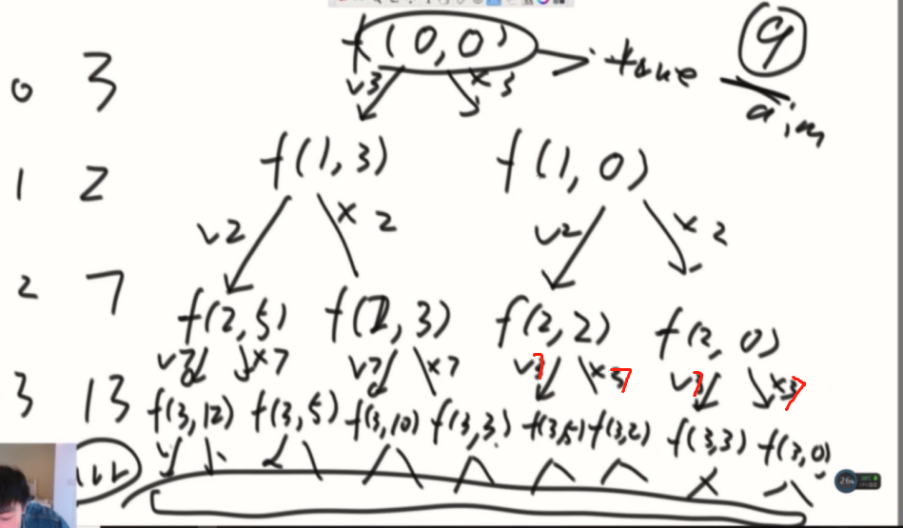
这是一个无后效性问题。可以使用dp,不管之前做了什么选择,只要是之前的累加和、步数是固定的,返回值一定确定。

i就是数组长度,sum的范围是全部数的和。

首先查看递归的base case,分析出最后一行,只有aim对应的列是T其余全是F,通过查看递归的规律,普遍的位置依赖的是两种情况,[i+1,sum]和[i+1,sum+arr[i]],逐个计算把整个dp数组填满。如果aim超出sum,那肯定是计算不出来的,因为sum是数组全部数加起来的和。
最后计算出[0,0]的位置,可以直接返回。
和题意没关系了。(从暴力递归中总结出来)

有负数怎么办?要设计一下
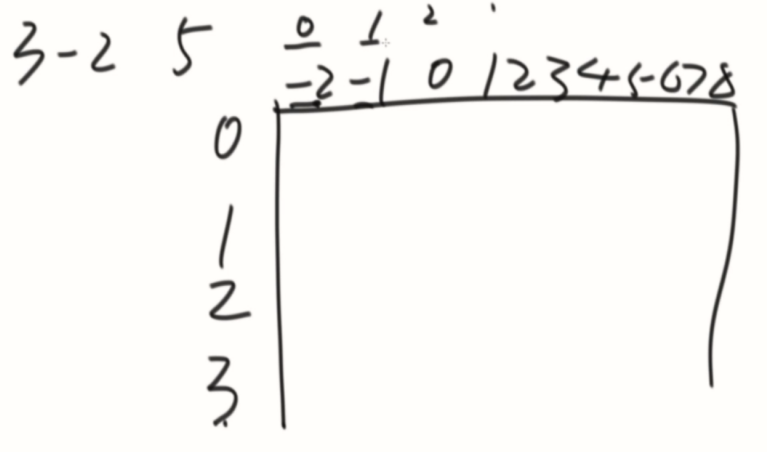
public class Code_08_Money_Problem { public static boolean money1(int[] arr, int aim) { return process1(arr, 0, 0, aim); } public static boolean process1(int[] arr, int i, int sum, int aim) { if (sum == aim) return true; // sum != aim if (i == arr.length) return false; return process1(arr, i + 1, sum, aim) || process1(arr, i + 1, sum + arr[i], aim); } public static boolean money2(int[] arr, int aim) { boolean[][] dp = new boolean[arr.length + 1][aim + 1]; for (int i = 0; i < dp.length; i++) { dp[i][aim] = true;//以目标金额为列的肯定为true } for (int i = arr.length - 1; i >= 0; i--) {//从最后一行开始 for (int j = aim - 1; j >= 0; j--) {//aim往后的都超过,没必要看 dp[i][j] = dp[i + 1][j];//通过直接的下方的判断。 if (j + arr[i] <= aim) {//如果该数加上arr[i](当前可以累加的数)少于等于目标数。 // 有可能可行,通过查看加上了arr[i](当前可以累加的数)的状态来判断 dp[i][j] = dp[i][j] || dp[i + 1][j + arr[i]]; } } } return dp[0][0]; } public static boolean check(int[] arr,int i,int sum,int aim){ if (i == arr.length){//判断是否走到最后一步 return sum == aim; } return check(arr,i+1,sum,aim) || check(arr,i+1,sum+arr[i],aim); } public static void main(String[] args) { int[] arr = { 1, 4, 8 }; int aim = 12; // System.out.println(money1(arr, aim)); // System.out.println(money2(arr, aim)); System.out.println(check(arr,0,0,aim)); } }
题目九
给定两个数组w和v,两个数组长度相等,w[i]表示第i件商品的重量,v[i]表示第i件商品的价值。 再给定一个整数bag,要求你挑选商品的重量加起来一定不能超过bag,返回满足这个条件下,你能获得的最大价值。
public class Code_09_Knapsack { public static int maxValue1(int[] c, int[] p, int bag) { return process1(c, p, 0, 0, bag); } public static int process1(int[] weights, int[] values, int i, int alreadyweight, int bag) { if (alreadyweight > bag) { return 0; } if (i == weights.length) { return 0; } //每次就两种情况:1、不拿商品 2、拿商品承担重量 return Math.max( process1(weights, values, i + 1, alreadyweight, bag), values[i] + process1(weights, values, i + 1, alreadyweight + weights[i], bag)); } //carat 克拉/重量 price 价值 public static int maxValue2(int[] c, int[] p, int bag) { int[][] dp = new int[c.length + 1][bag + 1]; for (int i = c.length - 1; i >= 0; i--) { for (int j = bag; j >= 0; j--) {//超过bag将毫无意义 dp[i][j] = dp[i + 1][j]; if (j + c[i] <= bag) { dp[i][j] = Math.max(dp[i][j], p[i] + dp[i + 1][j + c[i]]); } } } return dp[0][0]; } public static void main(String[] args) { int[] c = { 3, 2, 4, 7 }; int[] p = { 5, 6, 3, 19 }; int bag = 11; System.out.println(maxValue1(c, p, bag)); System.out.println(maxValue2(c, p, bag)); } }